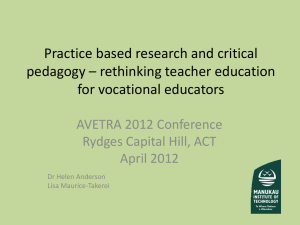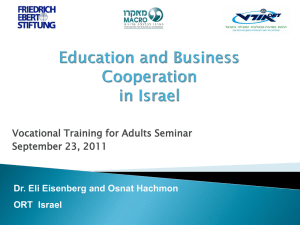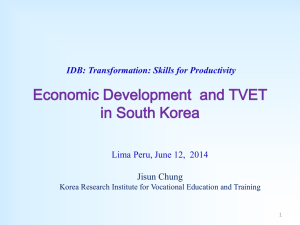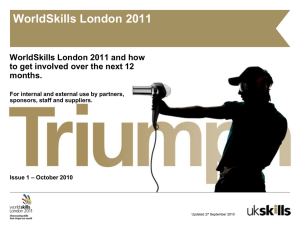Can skills competitions help to raise the attractiveness of VET
advertisement
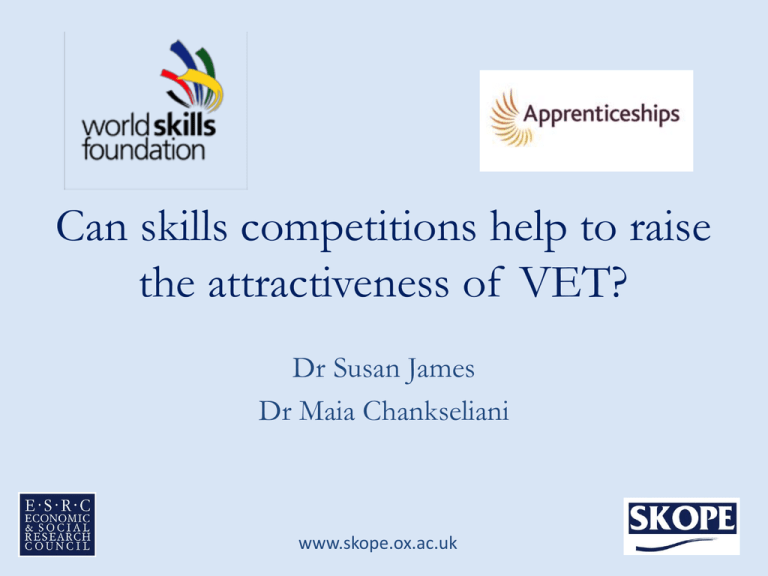
Can skills competitions help to raise the attractiveness of VET? Dr Susan James Dr Maia Chankseliani www.skope.ox.ac.uk Vocational academic divide % of vocational students of the total at upper secondary 40.0 0.0 Cyprus Japan Hungary Lithuania Greece Ireland Iceland Estonia United Kingdom Latvia Malta Portugal Turkey France Spain Denmark Poland Germany EU 27 Bulgaria Norway Sweden Italy Macedonia, the Luxembourg Romania Switzerland Slovenia Netherlands Finland Slovakia Croatia Belgium Czech Republic Austria Liechtenstein International participation rates in vocational programmes 80.0 70.0 60.0 52 50.0 36 30.0 20.0 10.0 Source: own calculations based on European Commission (2011) data % of respondents who would recommend VETover general education/HE Relative esteem internationally of VET in relation to general education 60 50 40 32 30 26 20 10 0 Source: own calculations based on European Commission (2011) data, Guthrie et al (2012) What is attractiveness of VET? Watters (2009): Status, image, relevance and quality Lasonen & Gordon (2009): Attractiveness is observed as preferences, attitudes and related behaviour of individuals and groups Winch (2013): ‘Attractiveness’ in relation to TVET means the preferability of TVET compared with alternatives www.skope.ox.ac.uk Policy focus • The UK aims to become one of the top countries in the world for jobs, productivity and skills (Leitch Review, 2006; UKCES, 2009) • Wolf Review (2011) concluded that UK vocational education and training system is still failing many young people www.skope.ox.ac.uk Research background • Long-standing history of criticism of the UK vocational education and training (VET) system • Focus has typically been on a ‘deficit’ model • Positive stories of VET receive far less attention • Scarce research on how excellence in vocational education is developed www.skope.ox.ac.uk ‘A youth festival in which competitors would recognise their role in helping to construct the future. Individual excellence is recognised in sports and the arts, and for this reason it was felt that achievements in vocational education and training were deserving of the same (Wilson, 2000, p. 201). The UK skills competition cycle Internal Competitions Regional Heats National Finals Team UK www.skope.ox.ac.uk Team UK for WS London 2011 Team UK for WS Leipzig 2013 Video www.skope.ox.ac.uk Developing and Understanding Vocational Excellence (DUVE) Research Overarching research questions: • What are the characteristics of individuals who excel? What kinds of support enable the development of highlevel vocational skills? • How can vocational education be structured to aim not just for minimum standards of high achievement but for high achievement that reflects world class standards? • Can broader societal benefits to developing vocational excellence be identified? • Developing and Understanding Vocational Excellence (DUVE) research projects Project 1. Modelling the characteristics of vocational excellence Aim: to study the characteristics of young people involved in the WorldSkills UK programme. Project 2. Learning environments to develop vocational excellence Aim: to understand what constitutes a learning environment where world-beating performance can be developed. Project 3. Benefits of developing vocational excellence Aim: to examine how and in what way skills competitions provide social and economic benefits, not only to the individual involved but also to society. Project 4. FE college participation in WorldSkills Aim: to establish benefits and costs of involvement in skills competitions for FE colleges. Project 5. WorldSkills contestants and entrepreneurship Aim: to illustrate how the acquisition of greater skill and capability might develop entrepreneurial instinct and ideas and to investigate the sustainability of the activities involved. Project 6. Training managers: benefits and barriers to WorldSkills UK participation Aim: to identify the main benefits and barriers facing TMs in order to inform WorldSkills UK in the recruitment, selection and training of TMs in the future. Conceptual understanding of benefits for different stakeholders and wider society Methodological overview Method: semi-structured interviews Sample of semi-structured interviews: 39 competitors and their 71 associates (employers, family members/friends, college tutors and training managers) www.skope.ox.ac.uk Skills categories Auto-body repair Automotive technology Beauty therapy Bricklaying (2) Cabinet making (2) Car painting (2) Carpentry (2) Confectioner/pastry cook (2) Cooking (4) Electrical installations (2) Floristry Graphic design technology Jewellery Landscape gardening (2) Manufacturing team challenge Mechanical engineering CAD Mobile robotics Painting and decorating (2) Pastry chef/ confectionary Plumbing and heating (2) Restaurant service Stonemasonry (3) Visual merchandising Welding www.skope.ox.ac.uk Benefits to employers • Employers received good publicity and higher prestige • Employers observed enhanced employee performance • Employers gained satisfaction from showing commitment to skills development • Some firms reported improvements in recruitment • Companies reaped teamwork-related benefits • Competitors exposed their employers to new techniques or products • Some companies attracted more business clients www.skope.ox.ac.uk Benefits to industries The WSC helped to raise industry profiles: ‘If it raises the profile of the craft, more people understand it and are keen to get involved in it, that's surely what it's about. It's about preserving that and keeping it going and hopefully developing it and the more times that that can happen or the more people that you take on and employ, it's only helping that side of things.’ (Employer) The WSC contributed to raising industry standards: ‘There’s up to twenty different countries in one competition, just on that one subject, so if you’re a landscape gardener, and there’s twenty different ways to landscape, different ideas… they can bring this new design back, and spread it between all the different companies.’ (Competitor, 2007) Benefits to tutors and colleges • Involvement in WSC enhanced college reputation • Standards of teaching and learning are improved • WSC participation attracted more students • College involvement in the WSC had a positive influence on their students www.skope.ox.ac.uk College tutor (CL)/university lecturer (UL) views on low attractiveness of VET ‘I worked all over the world in vocational training, in developing countries and things, and vocational skills in this country are still seen as second best.’ (CT/Training Manager) ‘In Europe it is not a problem. When you mention vocational training, it’s not a dirty word. It’s respectable. It’s got a respectable meaning there. Here, it’s a slightly different scenario in the UK.’ (UL) www.skope.ox.ac.uk Competitor views on low attractiveness of VET ‘The construction industry that I'm in they are always looked at as dirty, scum bags, you know; it's sort of looked at as not a profession, not as where you've got a bank manager or a doctor.’ (Competitor, 2009) ‘People who work with their hands probably aren’t looked upon as the highest of the high, you know? The academic route is probably favoured more by parents, because they think it’s going to earn more money, because they’re going to do better in life.’ (Competitor, 2009) ‘We never at school got told if you do well in your exams you could get an apprenticeship. We never ever got told that. It was always if you do well in your exams you could be a doctor or work in a bank or do this or do that. You never get told that you can go and do bricklaying or you can be a plumber.’ (Competitor, 2009) www.skope.ox.ac.uk Employer views on low attractiveness of VET It’s a kind of a cultural thing; we’re not very impressed by people who are good at doing things. So artisans in this country, although they might have studied as long or longer than somebody who would need to be a doctor, or an architect, they don’t carry the same kudos and it’s not as impressive, which I think is a real shame, and it’s definitely a cultural thing. I’ve seen it from both sides. I did an apprenticeship here, but I’ve become a designer. And I know if I say to people I’m a designer, then that’s more impressive than saying I’m a furniture maker or I’m a cabinet maker. And it’s just to do with the way that people perceive how professional you are. I always remember with [the gold medallist], there was a kind of mention in [a newspaper] and I don’t actually know what it is they asked [the gold medallist], but the answer to their question was, ‘the only time I write anything, every week, is when I fill out my time sheet.’ And there was a kind of backhanded compliment there in terms of, ‘Well you’re not very academic, so it’s great that you’ve found something you’re good at.’ Which is far from the truth, you know, a lot of the people that we take on have got very good marks at GCSEs and A levels, and they’re very intelligent, and they’ve just chosen to follow a non-academic direction. But you do see that kind of negativity a little bit, in terms of people that are not academically gifted; they need to find something else that they can be good at. Can skills competitions make VET more attractive to young people? www.skope.ox.ac.uk Findings on how competitions may influence attractiveness of VET Establishes positive societal image of young people who have choosen a vocational pathway Raises awareness of various vocations Provides inspiring examples of excellence and success in VET Shows that VET is associated with considerable economic benefits Shows that VET may lead to a proper career Makes VET attractive to females Positive societal image of young people who choose a vocational pathway The WorldSkills competition develops ‘the belief in youngsters [at a time when] people seem to be losing faith in young humans’. (Competitor, 2011) ‘There’s so much bad news all the time that actually it would be really lovely and good for the country to see young talent shine through. We’ve had all that ASBOs and young kids having bad names, but then you look at 23 young skills athletes, doing great things, and making the country better. That’s what is important.’ (Competitor, 2007) ‘You get respected as a young adult, whereas a lot of people may think a student just does nothing, and just constantly drinks, but it’s not true.’ (Competitor, 2011) www.skope.ox.ac.uk Awareness of various professions ‘The competition itself is a great vehicle for the youth to see what is available to them.’ (TM) ‘They can see what they’re doing, they can see what standard they're working to. If it’s brickwork, they can see the kind of work that they can produce. So for people looking at what career they want, I would say it’d be fantastic for them to see that.’ (Employer) ‘It gives [school children] a much wider choice of what they want to do when they leave school. So, I think WorldSkills is very good in that respect. When we went there, you could see all the school children walking round being engaged in and looking at what all these other people were doing.’ (Competitor's family) www.skope.ox.ac.uk Inspiring examples of excellence and success in VET The WorldSkills competition highlights what great skill people have and it doesn’t always need to be all about sitting behind a desk or being great on the internet. (Employer) ‘Yes it’s being able to inspire anyone really. And who knows who you’ll inspire?’ (Competitor, 2011) [Skills competitions] inspire youngsters to come and follow in the footsteps. (Competitor, 2005) ‘A lot more people want to do it, because of all the experiences I’ve told them about, all the opportunities I’ve had, loads of people want to get involved. And that’s the same at my college, where it basically all started; I’ve left quite a big, huge impact there.’ (Competitor, 2011) www.skope.ox.ac.uk VET leading to considerable economic benefits About 60% of the interviewed competitors indicated some economic benefits related to their participation in the WSC: ‘I'm a lot more financially stable now, which I never have been. But that comes through doing a lot of different things, climbing the ladder, which the competition actually helped me to do that.’ (Competitor, 2009) ‘Ninety per cent of the people that I speak to want to go out, want to get an apprenticeship. They don't want to do the university/college route. They want to go out and learn because they've seen the benefits. I see the benefits. I'm twenty two. I've got two cars. My own house. Someone that's gone to college and university doesn't have that. I have no debts.’ (Competitor, 2011) www.skope.ox.ac.uk Vocational route leading to a professional career Skills competitions help establish skills as real professions, not just ‘pretty jobs’: ‘It gives you a real good backbone. Yes, we are professional, we’ve trained very hard, the techniques we do, only a trained florist can do and you’re treated differently, not just like a small shop assistant. We are professionals; we do beautiful work that only florists can make.’ (Competitor, 2007) The WSC gives a vocational career ‘an appeal, lift[ing] it from being what could be seen as a mundane job, that you can go to very high levels doing this, it flags that up to people’ (CT). By show-casing what can be achieved in vocational professions, skills competitions demonstrate that the vocational route may be as valuable as the academic one: ‘What he did I think was far more impressive than three years at university frankly. Because of what the World Skills people did for these young people, to help them to mature and to cope with stress they'd have never got that at university, never.’ (Competitor's family) Making VET attractive to females One of the employers of a female systems engineer argued that her participation promoted ‘not just the apprenticeships, but women in engineering as well.’ ‘Having [the competitor] as a young lady in engineering, which is one of the areas where we struggle to recruit young women, it is a very male-orientated subject area, we've certainly seen there are gradually increasing number of girls applying for our courses. So that could be a positive that comes out of it, if they're looking at our prospectus and we've got [the competitor] talking about engineering and how much she enjoyed the course, and working at [company name], and being involved in the WorldSkills, obviously, that's a really positive role model for young women to look towards. So that, I would imagine that has had some sort of positive effect.’ (College Tutor) www.skope.ox.ac.uk Findings on how competitions may influence attractiveness of VET Establishes positive societal image of young people who have chosen a vocational pathway Raises awareness of various vocations Provides inspiring examples of excellence and success in VET Shows that VET is associated with considerable economic benefits Shows that VET may lead to a proper career Makes VET attractive to females ‘The world's best kept secret’: how could the information on skills competitions reach young people? ‘If you know about it then you get caught by it. If you don’t know about it, it just goes over your head.’ (Competitor, 2009) ‘If only the people who don’t know about it could see what we saw, they’d be totally and utterly amazed. It’s just out of this world.’ (Competitor, 2007) ‘If it was publicised more into schools and colleges, it gets young people excited, interested in that vocational skill. And I suppose, eventually that leads onto jobs and things, which I think, in the current climate, there are lots of people that have either gone to university or colleges or whatever, that are struggling and can’t find a job.’ (Competitor, 2005) www.skope.ox.ac.uk Where next? www.skope.ox.ac.uk Developing and Understanding Vocational Excellence - DuVE Research team: • Prof Ken Mayhew, PI • Dr Susan James, co-PI • Dr Maia Chankseliani, Research Officer • Dr Andrea Laczik, Consultant • Ms Jennifer Allen, Research Officer • Ms Marta Mordarska, Research Officer • Prof Petri Nokelainen, Consultant • Dr Cathy Stasz, Consultant www.vocationalexcellence.education.ox.ac.uk www.skope.ox.ac.uk References European Commission. (2011). Attitudes towards vocational education and training: Special Eurobarometer 369. European Commission. Retrieved from http://ec.europa.eu/public_opinion/archives/ebs/ebs_369_en.pdf Eurostat. (2011). Students at ISCED level 3-VOC - as % of all students at ISCED level 3. European Commission. Retrieved from http://epp.eurostat.ec.europa.eu/portal/page/portal/education/data/database# Guthrie, S., Holmes, C., Stasz, C., Ertl, H., Castle-Clarke, S., Drabble, S., and Villaba van-Dijk, L. (2012), Attractiveness of initial vocational education and training in Europe: What really matters, Final report to Cedefop, PR-362, Cambridge: RAND Europe Lasonen, J., & Gordon, J. (2009). Improving the attractiveness and image of VET. In Modernising Vocational Education and Training: Fourth report on vocational training research in Europe. Luxembourg: Publications Office of the European Union. Retrieved from http://www.cedefop.europa.eu/etv/Upload/Information_resources/Bookshop/567/3050_3_en.pdf Leitch, S. (2006). The Leitch Review of Skills: Prosperity for all in the global economy - world class skills. Department for Employment and Learning. Retrieved from http://www.delni.gov.uk/leitch_finalreport051206%5B1%5D-2.pdf UKCES. (2009). The Employability Challenge (Article). Uk Commission for Employment and Skills. Retrieved from http://www.ukces.org.uk/publications/employability-challenge-full-report Watters, E. (2009). Making initial vocational education and training more attractive for learners (Report for ENQAVET). Retrieved from http://www.deqavet. de/_media/PDF_allgemein/TG_Report_MIVMA.pdf Wilson, J. P. (2000). Citius. Altius. Fortius. Peritius: the Skill Olympics and skill competitions. Industrial and Commercial Training, 32(6), 201–208. doi:10.1108/00197850010354223 Wolf, A. (2011). Review of vocational education: the Wolf Report. Department for Education and Department for Business, Innovation & Skills. Retrieved from https://www.gov.uk/government/publications/review-ofvocational-education-the-wolf-report



